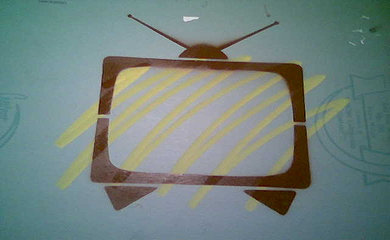Irritatingly, I find myself deeply enjoying yet another police drama. This whole thing is starting to make me highly suspicious about my supposedly anti-establishment leanings—perhaps pop culture is succeeding too well at indoctrinating me with a love of the police force. Either that, or it dedicates more resources to making police dramas excellent than it does to other programmes, with the exception of the endless reality television splooging about all over US television screens.
So what’s caught my eye now? The relatively new Fox show Almost Human, which is, well, yes, a police drama, but it’s also science fiction, so I’m going to justify my deep enjoyment of it on those grounds so as to avoid losing my union card. Set in 2048, Almost Human envisions a world where technology has run amuck, creating considerable social problems, not least of which is difficulties for law enforcement officers struggling to keep ahead of the latest criminal technologies—for, as we all know, the only ones better at developing and exploiting new tech than the military are, naturally, criminals.
In the world of Almost Human, every human police officer is paired with an android counterpart for safety and efficiency. Detective John Kennex (Karl Urban), woken from a coma after a bust gone very bad, objects strenuously to this, rejecting the standard-issue police model in favour of an older and deprecated model, the DRN. The DRN, known as Dorian (Michael Ealey), is not just a law enforcement tool, but also an android designed to demonstrate emotion, compassion, and complex thinking—he is, in other words, almost human. These very traits made his type undesirable before because they applied feeling and emotion to situations, not just logic.
The hellish landscape of 2048 Los Angeles is filled with all sorts of dark blue murky lighting effects and sleek cars, but it’s lacking in the magical realism and strangeness of many other J.J. Abrams creations. This is straight hard science fiction, and it’s a welcome appearance on US television, which doesn’t have much in the way of science fiction airing at the moment, and even less in terms of hard science fiction; shows like Fringe tended toward the paranormal in nature, instead of the more futuristic, realistic, and troubling world of Almost Human.
With clear inspiration taken from films like Bladerunner, this show dumps the user square into a complicated, strange, and tricky underworld. There’s a corrupt police force, a deep mystery surrounding Kennex’ tragically doomed raid, and a series of informants, creatures of the night, and other shady characters who shift through the narrative. Kennex is obviously supposed to lie at the core of the drama, complete with his martyr complex over the loss of his leg in the accident that left him so seriously injured he lay in a coma for almost two years—notably, Urban is not a amputee.
But it’s Dorian whom I find most interesting, as the conscience of Kennex and the show at large. As always, it’s a pleasure to see a character of colour playing a major role on US television, and this is truly a distinctive and outstanding role, one which requires creating a delicate balance that slips into the uncanny valley at times. Kennex is playing something he is not; he is discarding his humanity with this role at the same time that he is supposed to be depicting an android ensnared in humanity. The result is fascinating, that of a quixotic, intriguing, sometimes quirky character who is fundamentally sharper, more useful, and more thoughtful than those who sneer at him and call him a “synthetic.”
As the compelling character, Dorian neatly steals the show from Kennex. Kennex is nothing new to me: he’s the old hardboiled, bittered detective we’ve seen a thousand times in narratives just like this one, complete with his share of moral righteousness and firm belief that he’s the only man who can bring justice to his broken world. Dorian, though, is different, and as a fish of a different colour, he stands out brilliantly from the narrative; he breaks through everything else on television right now.
For those who have been longing to see some hard science fiction on the television again, Almost Human creates an opportunity to vanish into imagined new worlds that are very different from the paranormal or fantasy-focused depictions we see today. It shares the dystopian quality many people seem to be craving at the moment, tapping into a consciousness that demands visions of a horrific future filled with advances that harm, rather than help, humanity, but this is classic, 1980s, Hackers dystopianism. For Almost Human, there is no collapse of humanity followed by attempts to rebuild: this is a look right into the whirling eye of humanity at its worst.
One of the things that Almost Human makes me want to do is revisit some of the classic hard science fiction dystopian film of my youth, because the series is making me intensely nostalgic. And perhaps that’s the secret to why I’m so drawn to it.

